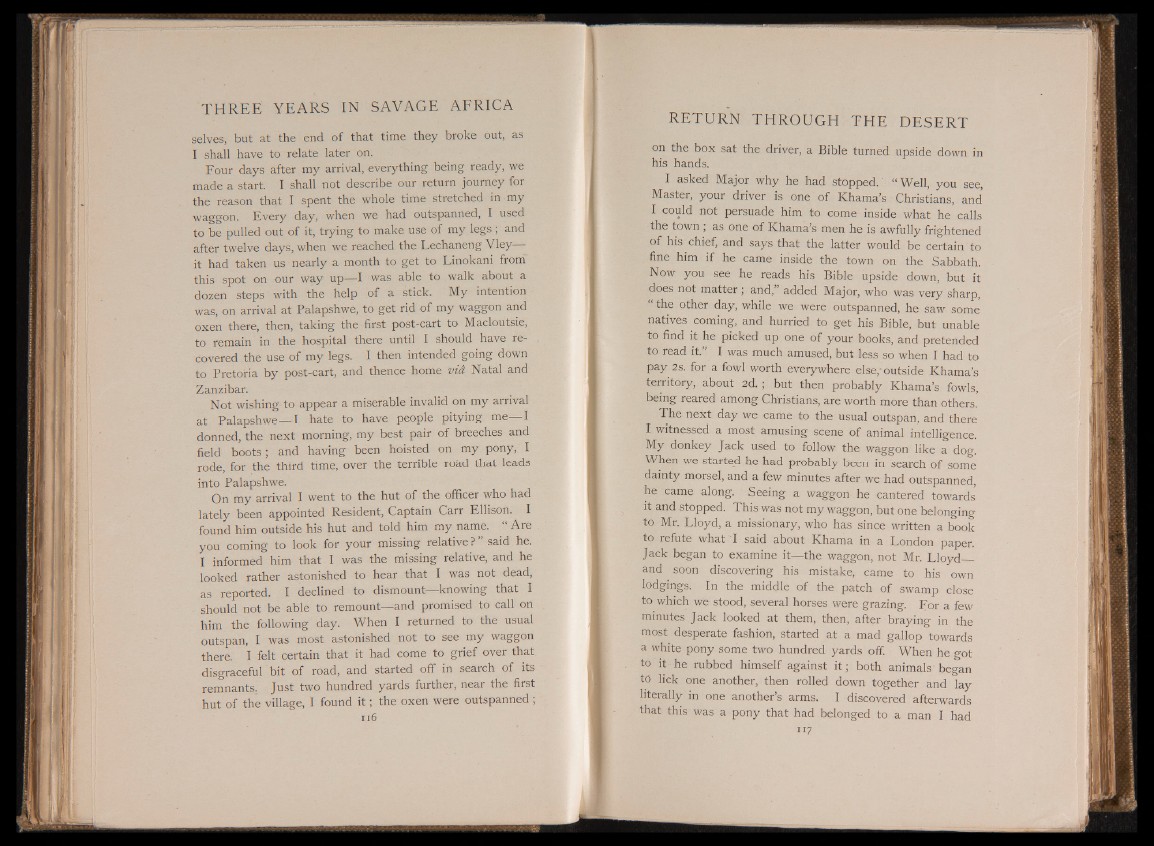
selves, but at the end of that time they broke out, as
I shall have to relate later on.
Four days after my arrival, everything being ready, we
made a start. I shall not describe our return journey for
the reason that I spent the whole time stretched in my
waggon. Every day, when we had outspanned, I used
to be pulled out of it, trying to make use of my legs ; and
after twelve days, when we reached the Lechaneng Vley—
it had taken us nearly a month to get to Linokani from
this spot on our way up—I was able to wralk about a
dozen steps with the help of a stick. My intention
was, on arrival at Palapshwe, to get rid of my waggon and
oxen there, then, taking the first post-cart to Macloutsie,
to remain in the hospital there until I should have recovered
the use of my legs. I then intended going down
to Pretoria by post-cart, and thence home vid Natal and
Zanzibar.
Not wishing to appear a miserable invalid on my arrival
at Palapshwe—I hate to have people pitying me I
donned, the next morning, my best pair of breeches and
field boots; and having been hoisted on my pony, I
rode, for the third time, over the terrible road that leads
into Palapshwe.
On my arrival I went to the hut of the officer who had
lately been appointed Resident, Captain Carr Ellison. I
found him outside his hut and told him my name. | Are
you coming to look for your missing relative?” said he.
I informed him that I was the missing relative, and he
looked rather astonished to hear that I was not dead,
as reported. I declined to dismount—knowing that I
should not be able to remount—and promised to call on
him the following day. When I returned to the usual
outspan, I was most astonished not to see my waggon
there. I felt certain that it had come to grief over that
disgraceful bit of road, and started off in search of its
remnants. Just two hundred yards further, near the first
hut of the village, I found i t ; the oxen were outspanned ;
on the box sat the driver, a Bible turned upside down in
his hands.
I asked Major why he had stopped.' “ Well, you see,
Master, your driver is one of Khama’s Christians, and
I could not persuade him to come inside what he calls
the town ; as one of Khama’s men he is awfully frightened
of his chief, and says that the latter would be certain to
fine him if he came inside the town on the Sabbath.
Now you see he reads his Bible upside down, but it
does not matter ; and,” added Major, who was very sharp,
“ the other day, while we were outspanned, he saw some
natives coming, and hurried to get his Bible, but unable
to find it he picked up one of your books, and pretended
to read it.” I was much amused, but less so when I had to
pay 2s. for a fowl worth everywhere else,-outside Khama’s
territory, about 2d. ; but then probably Khama’s fowls,
being reared among Christians, are worth more than others.
The next day we came to the usual outspan, and there
I witnessed a most amusing scene of animal intelligence.
My donkey Jack used to follow the waggon like a dog.
When we started he had probably been in search of some
dainty morsel, and a few minutes after we had outspanned,
he came along. Seeing a waggon he cantered towards
it and stopped. This was not my waggon, but one belonging
to Mr. Lloyd, a missionary, who has since written a book
to refute what I said about Khama in a London paper.
Jack began to examine it—the waggon, not Mr. Lloyd—
and soon discovering his mistake, came to his own
lodgings. In the middle of the patch of swamp close
to which we stood, several horses were grazing. For a few
minutes Jack looked at them, then, after braying in the
most desperate fashion, started at a mad gallop towards
a white pony some two hundred yards off. When he got
to it he rubbed himself against it; both animals began
to lick one another, then rolled down together and lay
literally in one another’s arms. I discovered afterwards
that this was a pony that had belonged to a man I had
1 1 7